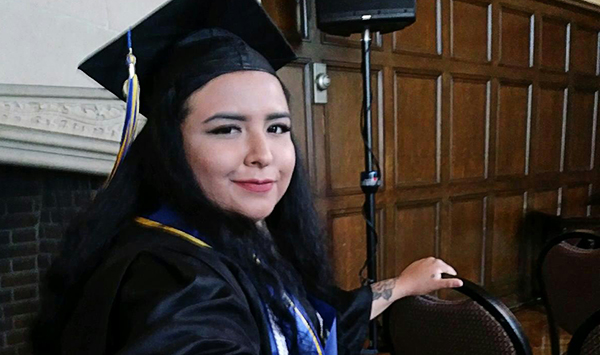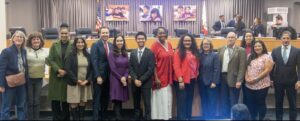
To celebrate the accomplishments of the class of 2017, we interviewed recent graduate, Natasha Castro. In this interview she discusses her experience in the labor and workplace studies minor and her plans for the future. Combining rigorous coursework with diverse field placements, this program brings ideas and action together to reinforce student learning. Every year, over three hundred students participate in internships and service-learning opportunities with community organizations, unions, and public service organizations.
Tell us a little bit about yourself?
I grew in the Pico Union neighborhood of Los Angeles and I’m a transfer student from East Los Angeles College (ELAC). I’m really interested in issues regarding intersectionality, specifically when it comes to the different issues that intersect and impact the working class and people of color. I’m really passionate about workers rights and all issues regarding social justice especially given the current political climate, I think it’s very important we advocate for all communities that are under threat because I believe you can’t advocate for the social justice for one group and ignore the oppression of another group.
What’s your favorite professor? What was your favorite Labor Studies minor course?
My favorite professor and favorite class would have to be the class I took titled, Working Families and Educational Inequalities in Urban Schools, with Dr. Janna Shadduck-Hernández. She’s been my favorite professor and she’s also been my mentor and supervisor at the UCLA Labor Center. When I first took this class with her it was easy to see she was very passionate about addressing educational disparities among students that attend inner-city schools. I also really appreciated that she was genuinely interested in my experiences and in my life story. I’ve never had a professor at UCLA that was encouraging as her. I really liked that class because I got to do research on my own community and write a paper on gang injunctions and discuss how gang injunctions affect the educational attainment of youth and how they stigmatize and criminalize individuals living in those neighborhoods. It was really important for me to tell that story and the story of my community.
What are you doing after graduation?
I plan to find employment that’s related to continuing my work with worker’s rights and issues that impact workers. I’ve also always had a dream to work with at-risk and incarcerated youth here in Los Angeles due to my own experiences in my adolescence. I would really like to encourage youth to go to school. I think education is a very powerful tool to liberate yourself and entire communities.
Who or what inspires you?
I would have to go with “what” inspires me. The stories and experiences people share inspire me. Before coming to UCLA I was a very private person and I didn’t really like sharing my own personal experiences with people because I always felt that maybe they wouldn’t understand especially at a place like UCLA. It’s difficult to talk about certain things that people might criminalize you. Being part of this minor, I really saw the power that stories can have and I realized that through sharing my own story, I could possibly inspire other people that might have gone through what I experienced.
What type of work she did at the Labor Center?
When I first started working at Labor Center, I initially worked on a study focused on garment workers. I was tasked with conducting research on hazardous working conditions in garment factories. Then I also worked on the infographics for this report and I was really happy to be a part of that. More recently, I’ve been involved in the I am #YoungWorker project so I’ve worked on graphically designing curriculums, presentations, and materials for this project.
So you enjoy graphic design?
I’ve always been artistic but I had not felt inspired for a while. I had always enjoyed drawing and painting. Then, when I started working on the garment worker report, I felt inspired again. Eventually I developed different icons and infographics and I noticed I really liked it and I had a knack for it. I think I got really good at designing these elements even though I did not have formal experience in this field. Now, I’ve designed flyers, programs, and know your rights fact sheets.
What 3 hashtags would describe your time as a Labor Studies Minor at UCLA?
#Empowering, #Liberating, #LifeChanging, #Challenging
Is there anything else you would like to share?
Overall, I think I received an education that is not only important given our current political climate but it’s also very meaningful. The labor and workplace studies minor is structured in a way that make it intersectional, it covers so many different issues affecting so many different communities. It’s not just labor, the classes really tackle issues that affect everyone, working class communities. I am prepared with the knowledge to fully understand all these different issues. It’s important to understand everything you can’t just understand one aspect of it because you’re going to be missing the other things that are producing these social problems.

